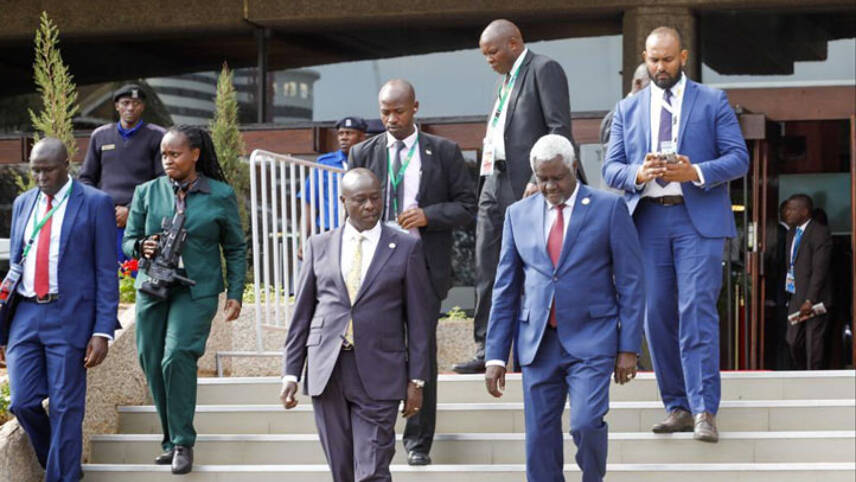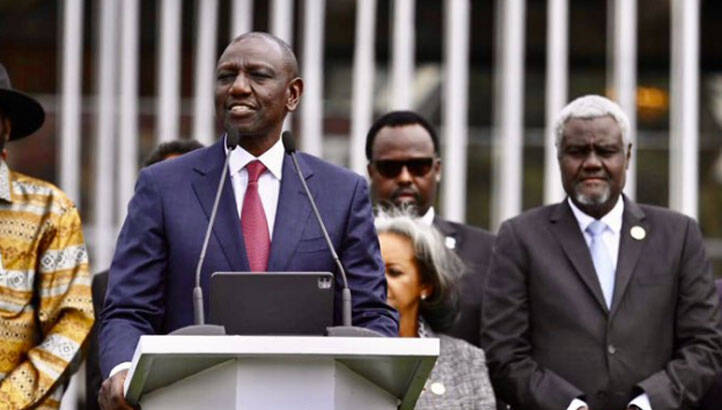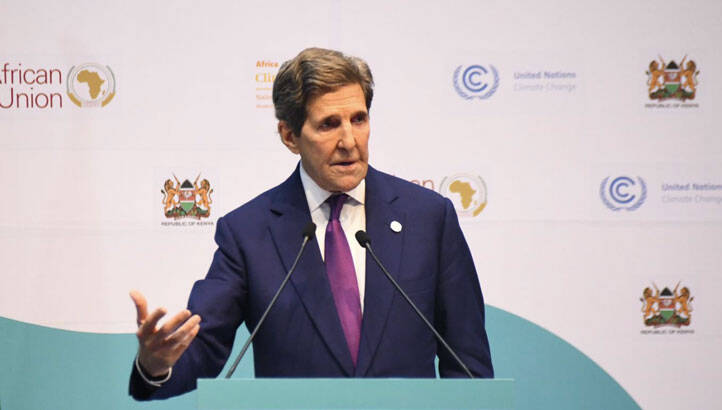Register for free and continue reading
Join our growing army of changemakers and get unlimited access to our premium content

Pictured: World leaders on their way to announce the Nairobi Declaration. Image: African Union
The Africa Climate Summit began in Nairobi, Kenya, at the start of the week. It was the first event of its kind, hosted to convene political leaders, academic experts and decision-makers in the private sector for talks on climate action.
More than 20 policy leaders from African nations convened to develop a new ‘Nairobi Declaration’. This communique includes new pledges to collaborate in growing clean technology sectors and joining up climate adaptation efforts.
It also makes fresh calls to action to leaders in the Global North to deliver on long-standing, yet unmet, promises around international finance. It is estimated that Africa needs $300bn of annual climate finance by the end of the decade, and that it currently receives around $36bn.
Beyond the Declaration, several side events were held, at which businesses, investors and world leaders announced eye-catching new initiatives relating to the energy transition and food systems.
Here, we round up all the key outcomes from the Summit.
Energy transition investments
The International Energy Agency (IEA) has stated that, while Africa is rich in the metals and minerals needed for renewable energy infrastructure and components, it attracts only 2-3% of global annual investments in clean energy.
Installed capacity is, therefore, low compared with other regions. The IEA estimates that Africa hosts just 1% of the global capacity for solar.
The Nairobi Declaration sets a new target for Africa to host at least 300GW of renewable energy generation capacity by 2030, up from 56GW at present. This will be necessary to deliver energy access and decarbonise the private sector, the document states.
In support of this target, the Africa Development Bank announced $23bn for “green growth, mitigation and adaptation efforts”. A significant proportion of this total is expected to go to clean energy generation and energy infrastructure.
Of this funding, $4.5bn is being provided by the United Arab Emirates (UAE) – the host nation for this year’s UN climate summit. Almost half a billion more is being provided by Germany. Both of these nations are allocating their contributions to the energy transition.
Climate justice

Pictured: Kenyan President William Samoei Ruto. Image: ACS
The Declaration also tackles the some of the inequalities associated with the climate crisis. Africa accounts for around 3% of historic greenhouse gas emissions but is on the frontlines of physical impacts, including an ongoing drought in the Horn of Africa.
The Declaration states that wealthier nations with larger and more emitting energy sectors – plus greater historic responsibility for the climate crisis – need to play their part by accelerating their own energy transitions.
It urges world leaders to “rally behind” new global carbon taxation measures, including taxes on fossil fuels for use in energy generation, shipping and aviation. Money raised could be funnelled into low-carbon sectors, protecting and restoring nature, and improving climate resilience.
The IMF estimates that more than 20 nations have some kind of tax on carbon. However, there is currently no global consensus on the issue.
Discussions in Nairobi also touched on how, in tandem with fossil taxes largely remaining steady, subsidies to the sector have been increasing. This plays a role in slowing the global energy transition and hampers efforts to deliver the Paris Agreement
Debates around whether carbon markets are a way to grow the economy, or simply grant permission for external parties to land grab and extract value from Africa, also took place. There were protests outside of the venue in strong opposition of offsets.
The major announcement inside the Summit was a $450m commitment from the UAE to purchase credits through the Africa Carbon Markets Initiative (ACMI), which launched at COP27 in Egypt last winter. A further $200m investment in projects set to produce credits for the ACMI was announced by Pollination and HSBC Asset Management’s joint venture, Climate Asset Management.
Financial infrastructure reforms
As noted above, the IEA has data showcasing how Africa has historically received only a fraction of international investment in clean energy. This is largely due, the Agency stated this week, to the perceived risk of investing in developing and emerging economies.
These nations have long been advocating for reforms to global financial architecture to lower the cost of capital and the risk of investment in fast-growing, low-carbon industries. This advocacy is now gaining traction due to efforts led by Barbados at COP27, concerning reform requirements for multilateral development banks.
Efforts are also underway to reduce the provision of loans with unfavorable terms, in favour of grants. African nations have warned for years about being locked into a vicious cycle of climate-related debt.
At this week’s Summit, Germany confirmed a $65m debt swap with Kenya, as one example of the kind of action possible. African nations also jointly published a working paper on debt relief as a first step towards joined-up action on this issue.
The IEA is recommending other interventions in tandem with these changes. One of them is that financial players – public and private should– launch more innovative, flexible products to support small-scale and remote renewables in Africa. De-risking could be achieved by blending government finance with private investment.
Food systems funding
Aside from the energy transition and low-carbon technologies, a key focus on the summit’s agenda was future-proofing food systems and restoring nature and soils.
Kenyan policymakers and leaders from the UAE met to agree on a new programme of collaborative work to unlock more food systems financing. A 1.5C-aligned, science-based roadmap has notably been promised by the UN ahead of COP28, which has a day on the agenda dedicated to food systems.
Another key meeting was between African nations and the US. American Special Envoy for Climate, John Kerry (pictured), pledged an additional $3bn annually for adaptation through the existing Prepare initiative.
He also announced a one-off $30m investment in food security in Africa. This fund, plus the lack of funding provided by other Global North Nation, did raise some eyebrows. Power Shift Africa’s director Mohamed Adow took to X (formerly Twitter) to call Kerry’s announcements “an insult coming from the biggest historic polluter and the wealthiest country on the planet”.
His Tweet adds: “The US owes Africa & the rest of the global south a climate debt. For Kerry to show up at [the Summit] to announce $30m is to hit the continent below the belt.”
The US, along with the EU and UK, had opposed the creation of a dedicated loss and damage fund until COP27. It is also among the nations participating in that unmet $100bn pledge.
More announcements on sustainable food in Africa are likely in the coming days, from a separate Africa Food Systems Summit in Tanzania.
Do you think the Africa Climate Summit was a success? Let us know your thoughts on the Nairobi Declaration and the other outcomes in the comments.



Please login or Register to leave a comment.